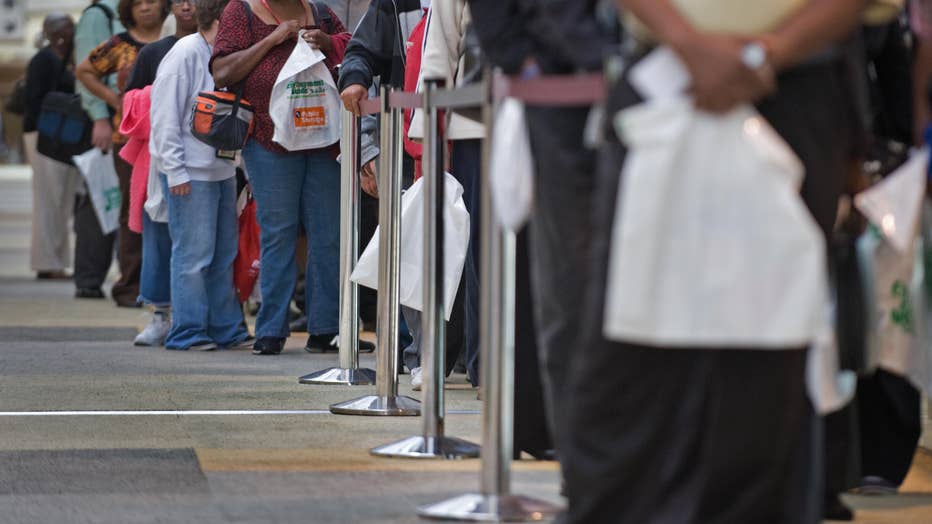Michigan's "return to work" grants would pay unemployed people $1,000 to find a job
LANSING, Mich. - Unemployed people who find a job would get $1,000 as part of $12.7 billion in proposed COVID-19 relief spending that began advancing in the state Legislature on Wednesday.

People seeking employment line up outside an employment guide job fair on September 17, 2009 at the Baltimore Convention Center in Baltimore, Maryland. Employers from various fields are attending the event in the hopes of recruiting new workers. New
The "return to work" grants would cover up to 400,000 residents, nearly half of the 839,000 receiving jobless benefits.
The Michigan Chamber of Commerce said the incentive would help businesses find desperately needed workers who, due to supplemental federal aid, can get $662 a week in unemployment -- the equivalent of more than $34,000 a year.
"The federal government has created a situation where it is in someone's better financial interest to stay on unemployment than it is to take that next job. And that's unfortunate," said Wendy Block, vice president of Business Advocacy and Member Engagement.
The provision is included in supplemental budget bills that the Republican-led House Appropriations Committee approved on party lines Wednesday or primed for committee passage Thursday, but are a ways off from being enacted since there is no deal with Democratic Gov. Gretchen Whitmer. All but $1 billion in funding would come from federal coronavirus packages that were approved in March and December.
Republican Rep. Thomas Albert of Lowell, who chairs the panel, said if the $1,000 payments enticed even 10% to 20% of those on unemployment back to the workforce, "that'd be a material difference in the state."
Also Wednesday, the GOP-controlled Senate's budget committee advanced $4.4 billion in aid, including all of the state's remaining federal funds from the December package. The funding has been in limbo amid Republicans' lack of negotiations with the governor and their attempts to curb her pandemic powers.
Much of the federal money is non-discretionary and, once approved, must go to K-12 schools, local governments, child care, food and rental assistance, coronavirus testing and vaccine distribution. But the state has flexibility with billions of dollars.
RELATED: Michigan job paradox: 238,000 unemployed but businesses can't find anyone to hire
Under the House proposal, the state would pay nearly $600 million toward a Flint water crisis settlement instead of borrowing the money upfront and paying $1 billion over 30 years.
Roughly $2 billion in hazard pay for frontline state workers, additional child care funding and spending on road debt was tied to a bill that would limit Whitmer's power to shift money within departments, which she did during a 2019 budget impasse. A provision seeks to reverse the state health department's recent requirement that child care facilities and camps make a "good faith" effort to see that 2- to 4-year-olds wear masks.
The plan also includes $25 million to incentivize state employees to leave their job for up to six weeks of pay.
Democrats objected to a provision that would require certain school districts and charter schools to offer at least 20 hours of in-person instruction a week by May 10 to receive all of an increase in per-student funding. A similar requirement was included in an earlier funding bill that Whitmer signed last month.

Owner of new restaurant can’t find people who want to work
Darren Lee is owner of Hopscotch and Bourbon in Roseville. He assembled just enough people to open and even tried to sweeten the deal, knowing he just doesn't have enough employees.
Rep. Regina Weiss of Oak Park said districts could lose funding if there is a coronavirus outbreak, adding that some provide face-to-face learning but less than 20 hours a week due to parents' preference for hybrid instruction.
"Since we don't know the future of this pandemic, wouldn't it make sense to give the districts the most flexibility with these dollars? she said.
Under federal law, the districts are due to receive a smaller share of $3.3 billion in aid than are districts with higher numbers or portions of poor students. Republicans want to allocate $362 million in state money to ensure hundreds of districts still get at least $1,093 more per pupil, as long as they offer the 20 hours a week on May 10.
"The incentive for in-person instruction's not a requirement," Albert said.

